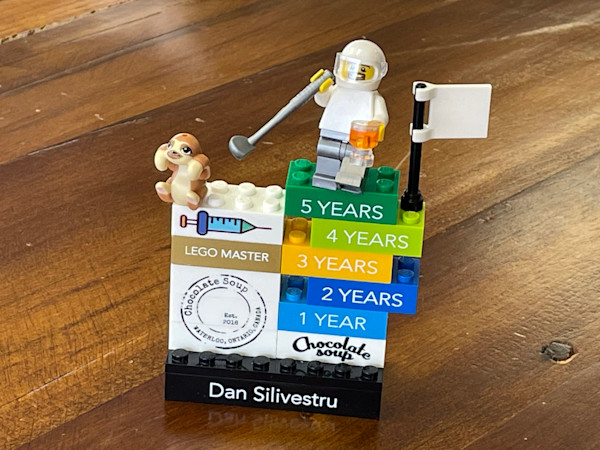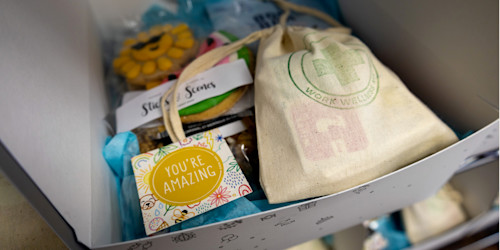Is making friends at work important to employee retention?
February 3, 2025

Employee engagement is a critical factor in organizational success. The level of employee engagement in an organization impacts hiring, retention, and even profitability. Here are five benefits to your organization from workplace friendships and a tangible example of how you can make it happen organically.
Employee engagement is a critical factor in organizational success. An organization's level of engagement impacts hiring, retention, and even profitability. A Gallup analysis of survey results showed that 21% of organizations with highly engaged workforces were more profitable than organizations with lower engagement levels.
Engaging in the workplace means different things to different people. It depends on everything from workplace culture to organizational communication to management styles to making friends at work.
You read that right. Making friends at work can be a significant factor in attracting engaged employees to your organization.
According to a BetterUp survey, 43% of people said they don’t feel a sense of connection with their teammates. Even more telling, 50% of people reported wanting more social connections at work.
You might be rolling your eyes at the thought of having to find a way to encourage people to make friends on top of all the other HR tasks you have — but don’t fret. We're going to start off with five benefits to your organization from workplace friendships and a tangible example of how you can make it happen organically (and without some awkward friendship matchmaking).
Five benefits of your employees having friends at work
Reduced stress - Whether it’s tight deadlines or a challenging new project, workplaces can be significant sources of uncertainty and unexpected stress. Having friends at work can help employees lower stress levels by providing opportunities to ask questions and get guidance.
Workplace friends are also there for something else critical to reducing stress — venting. Having a non-judgmental confidant at work means employees can let out how they feel to move forward in their work.
Trust - Doing great work with other people on a team or an organization takes trust. Employees do better work, are more productive, and make fewer mistakes when they know they can trust the people around them. Employee friendships help build this trust through shared experiences and interests from inside and outside the workplace.
Better communication. Communication is the key to building any great relationship. Workplace friendships help facilitate better communication through shared understandings, experiences, and the slang and shorthand that develop. When there is a sense of friendship, employees are also more likely to give constructive feedback to their fellow employees.
Collaboration. Communication and trust improve cooperation among employees, which in turn helps improve productivity and performance. When your employees can work faster together, they can solve problems and deliver for your customers.
Sense of belonging. Workplace friendships do more than make people feel happier — they make them feel connected with a strong sense of belonging. When your employees feel connected, they’re less likely to seek work elsewhere.
Creating a sense of belonging is also critical for your company’s onboarding process. The first few weeks in a new organization are an opportunity to help your new hires connect, make friends, and build relationships that will help them succeed in their roles.
How to build friendships when working remotely
Most of us have learned to build friendships with people we are physically near, whether at school, sports, or work. We can ask questions, listen to side conversations, and find ways to make connections.
Remote work has reshaped how employees connect and build relationships. In many companies, there are two groups of colleagues: those who worked together in person before transitioning to remote work and those who joined after the shift.
For the first group, existing friendships moved online through virtual team-building events, video calls, and digital collaboration tools.
New hires, however, don’t have the same in-person interactions that help foster friendships. Creating opportunities for employees to quickly discover shared interests—both inside and outside of work—is key to building strong connections in a remote environment.
We’ve seen this in action within our team. One of our recent hires noticed that my LEGO® figure has a racing helmet and a golf club during his onboarding. Seeing the figure sparked a conversation about golfing and local golf courses — a conversation that didn’t relate to work, but one that helped us find something in common.

My Build-Your-Career figure.
Instead of weeks going by with missed opportunities, they were able to connect and have played a few rounds together where they’re able to talk product roadmap, sales strategy, and more.
Employee recognition gifts are another way to create conversations that can lead to long-lasting friendships at work. We see firsthand how celebrating new arrivals, wedding anniversaries, and birthdays inspires people to post on Slack or other workplace communication tools.
Seeing a colleague sharing a photo of a new child can be a way to connect two new parents in the workplace. Personalized birthday gifts can provide a glimpse into an employee’s hobby or interest and be the spark of a new friendship.
Ready to get started? Contact us today to learn more about our personalized turnkey employee recognition programs.
Get Started
Start building your recognition culture with us today.
Ready to make a difference in your employees’ lives and watch your company culture thrive? Contact us to speak with a member of our passionate team.

